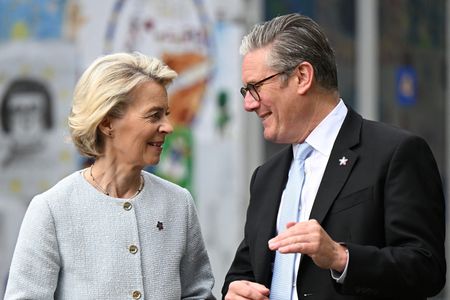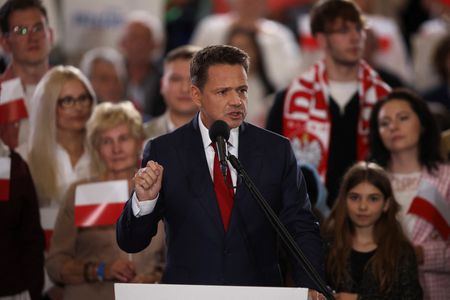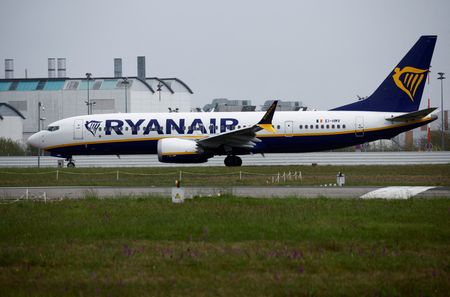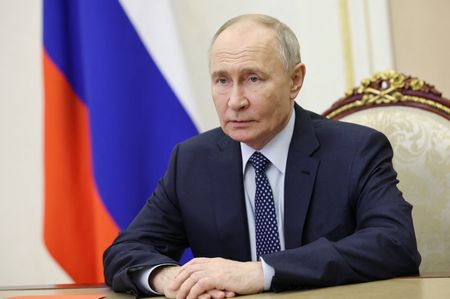By Kate Holton, Andrew MacAskill and Alistair Smout
LONDON/BRUSSELS (Reuters) – Britain is poised to agree the most significant reset of ties with the European Union since Brexit on Monday, seeking closer collaboration on trade and defence to help grow the economy and boost security on the continent.
Prime Minister Keir Starmer, who backed remaining in the EU, has made a bet that securing tangible benefits for Britons will outweigh any talk of “Brexit betrayal” from critics like Reform UK leader Nigel Farage when he agrees closer EU alignment at a summit in London.
Starmer will argue that the world has changed since Britain left the bloc in 2020, and at the heart of the new reset will be a defence and security pact that could pave the way for British defence companies to take part in a 150 billion euros ($167 billion) programme to rearm Europe.
Talks on the reset continued through the night and three people briefed on the talks said a breakthrough was secured ahead of Starmer’s meeting with European Commission President Ursula von der Leyen and European Council President Antonio Costa on Monday.
EU ambassadors were meeting in Brussels to approve it.
The reset follows U.S. President Donald Trump’s upending of the post-war global order and Russia’s full-scale invasion of Ukraine, which have forced governments around the world to rethink ties on trade, defence and security.
Britain struck a full trade deal with India earlier this month and secured some tariff relief from the United States. The EU has also accelerated efforts to forge trade deals with the likes of India and deepen partnerships with countries including Canada, Australia, Japan and Singapore.
From the issues up for discussion, Britain is hoping to drastically reduce the border checks and paperwork slowing down UK and EU food and agricultural exports, while access to faster e-gates for UK travellers at EU airports would be popular.
In return, Britain is expected to agree to a limited youth mobility scheme and could participate in the Erasmus+ student exchange programme. France also wants a long-term deal on fishing rights, one of the most emotive issues during Brexit.
LIMITED ROOM FOR MANOEUVRE
Britain’s vote to leave the EU in a historic referendum in 2016 revealed a country that was badly divided over everything from migration and sovereignty of power to culture and trade.
It helped trigger one of the most tumultuous periods in British political history, with five prime ministers holding office before Starmer arrived last July, and poisoned relations with Brussels.
Polls show a majority of Britons now regret the vote although they do not want to rejoin. Farage, who campaigned for Brexit for decades, leads opinion polls in Britain, giving Starmer limited room for manoeuvre.
But the prime minister and French President Emmanuel Macron have struck up a solid relationship over their support for Ukraine, and Starmer was not tainted with the Brexit rows that went before, helping to improve sentiment.
‘BREAK THE TABOO’
The economic benefit will be limited by Starmer’s promise to not rejoin the EU’s single market or customs union, but he has instead sought to negotiate better market access in some areas – a difficult task when the EU opposes so-called “cherry picking” of EU benefits without the obligations of membership.
Removing red tape on food trade will require Britain to accept EU oversight on standards, but Starmer is likely to argue that it is worth it to help lower the cost of food, and grow the sluggish economy.
Agreeing a longer-term fishing rights deal will also be opposed by Farage, while the opposition Conservative Party labelled Monday’s event as the “surrender summit”.
One trade expert who has advised politicians in both London and Brussels said the government needed to “break the taboo” on accepting EU rules, and doing so to help farmers and small businesses was smart.
Trade experts also said Britain benefited from the greater focus on defence, making the deal look more reciprocal, and said improved ties made sense in a more volatile world.
When “trade disruption is so visible and considerable” anything that reduced trade friction with a country’s biggest trading partner made sense, said Allie Renison, a former UK government trade official at consultancy SEC Newgate.
($1 = 0.8958 euros)
(Writing by Kate Holton; additional reporting by Philip Blenkinsop in Brussels; Editing by Aidan Lewis and Ros Russell)











